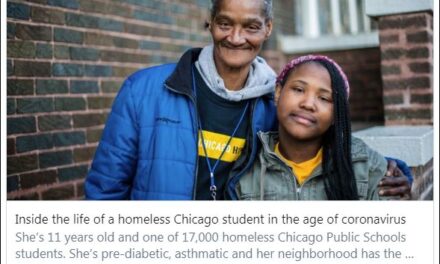In this week’s newsletter: Schools are reeling, students are left hanging, and some parents are furious. But season two of School Colors is on its way and one education reporter had an adorable encounter with a young student.
AFTER OXFORD, SCHOOL DISRUPTIONS INTENSIFY
The big story of the week, according to us:
Challenged by the return to in-person learning and reeling from the after-effects of the Oxford shooting, some schools are struggling with student misbehavior and copycat threats:
🔊 Schools Confront a Wave of Student Misbehavior (Wall Street Journal)
🔊 New threats of violence shutting schools down after tragedy in Oxford (District Administration)
🔊 Educators report a rise in school threats, fights and misbehavior (LA Times)
🔊 Teachers at Sacramento high school injured breaking up fights (SacBee)
🔊 Michigan schools are figuring out how to respond to a flood of shooting threats (NPR)
🔊 In the Michigan Shooting, What Is the School’s Responsibility? (NYT) See also AP
🔊 Advocates renew calls to make BPS schools safer following second attack (Boston Globe)
🔊 Teacher alarmed by drawings warned school leaders (The Detroit News)
🔊 Dozens of students could face charges amid rash of school threats (Detroit Free Press)
🔊 2 students charged with making Instagram threats (Sacramento Bee)

STUDENTS LEFT HANGING
The best education journalism of the week.
🏆 BEST: The best story of the week is Bay Area Teacher Sub Shortage Leaves Students Hanging by Julia McEvoy for KQED public radio. In 2018, Berkeley Unified could fill 69% of sub requests from the sub pool. This year, that number is down to 58%. Combined with disrupted schooling from the pandemic, the situation is particularly dire — especially for freshmen and sophomores who haven’t yet experienced a normal high school year. “I would describe a lot of the behavior we’re seeing as middle school behavior,” said one senior. “There are fights every single day, and then you combine that with teacher shortages, and safety officers aren’t coming as often and you get chaos.” McEvoy quotes a high school secretary in charge of finding substitutes each day, which is a great way to report the story. And she keeps the focus on the students as much as possible, which is not always easy to do.
🏆 RUNNER-UP: This week’s runner-up is LAUSD’s independent study program is overwhelmed. Students with disabilities pay the price by Melissa Gomez in the LA Times. In it, Gomez examines the impact on some of the most vulnerable students of LAUSD’s two-pronged pandemic plan for in-person classes and independent study, which is meant to allow some students to continue learning from home. To illustrate the issues, Gomez profiles one 11-year-old student named Maya who is deaf. For more than two months, Maya attempted to follow remote instruction without an ASL interpreter. Though she has one now, she is weeks behind. Gomez does a great job looking at a program that is supposed to offer parents and students greater choice, but sometimes ends up giving them almost no choice at all.
BONUS STORIES:
🏆 Is math education racist? (USA Today) See also: CalMatters
🏆 Oakland’s Mandate Could Strain Distance Learning Program (KQED)
🏆 Houston has 276 schools, nearly 200K students, and only 58 librarians. (Chronicle)
🏆 A White teacher taught White students about White privilege. It cost him his job. (Washington Post) See also: USA Today
🏆 Fort Bend closing virtual learning program as COVID-19 cases dwindle (Houston Public Media)

MISSING DETAILS FROM INSIDE OXFORD HIGH
New from The Grade
Above: The alleged Oxford school shooter.
What really happened in the critical moments before the Oxford High School shooting started? We still don’t really know.
More than a week later, we’ve heard the district’s version of events, and we know what law enforcement says happened. And we’ve heard from a lot of researchers and expert practitioners — some of them quite insightful.
But there’s still precious little that’s been reported from those who were there in person, and this week’s column from me argues that we need those firsthand accounts. That’s the reporting that could help other schools avoid making the same mistakes. And that’s where education reporters can really shine.
Of course, not everyone agrees with that perspective, including the NYC-based educator who goes by the name of Cafeteria Duty and writes that “there is no school safety protocol, or battalion of school resource officers, or number of active shooter drills that can save a school from two parents who [bought their 15-year-old son] a semi-automatic handgun.”

MEDIA TIDBITS
Thought-provoking commentary on the latest coverage.
Above: The week’s most haunting images accompany Searchlight New Mexico’s story, Where have all the children gone?.
📰 SMART WAYS TO REPORT ON SCHOOL SHOOTINGS: Bridge Michigan interviewed experts and practitioners to give readers a strong sense of what was possible — and what the limitations might have been. The Education Post’s Maureen Kelleher gleaned insights from a bunch of school social workers, educators, and parents, producing the most truly informative story I’ve read so far. The Washington Post’s Laura Meckler and Hannah Natanson teamed up to report on what experts say that schools can do to prevent school gun violence, which turns out to be quite a lot. NPR’s David Folkenflik interviewed mass shooting expert Jillian Peterson to learn about how school staff can team up to address potential school shootings. And Rachel Cohen’s Intercept piece reminded us about the practical and political limits of threat assessment in a country with lax gun control laws and fractured politics.
📰 PRYING INFORMATION FROM STONEWALLING SCHOOL DISTRICTS: “Don’t expect to get all your information from comments from the superintendent or PIO,” advised the Sun Sentinel’s legendary education reporter Scott Travis, who knows a thing or two about this. “Make public records requests for any info you want to know, even if you don’t know if you’re entitled to it.” What else? “Find helpful sources who are plugged in, like students, student government folks and PTA people.” Travis won a Pulitzer for uncovering how unprepared Broward County schools were leading up to the shooting at Marjory Stoneman Douglas High School, despite a district that stonewalled reporters at every possible turn.
📰 WHO YOU GONNA CALL? It can get tiresome talking to — or reading quotes from — the same experts. So here are a few folks who might be new to you and your readers. For CRT: Jamel K. Donnor, education professor at the College of William and Mary, Janel A. George, associate professor of law at Georgetown University Law Center, and Binghamton University’s Adam Laats. For school safety: Amy Klinger, program director of the Educators’ School Safety Network, Hamline University’s Jillian Peterson, and Melissa Reeves, former president of the National Association of School Psychologists. For deseg/integration/inequality: University of Louisville’s Tracy K’Meyer and Columbia’s Sonya Douglas Horsford. Got any other under-quoted academics and experts to recommend? Send them to us via thegrade2015@gmail.com.
📰 BIG STORIES GENERATE SHARP CRITICISM: Some of this week’s most-shared stories were also subject to heated criticism from fellow journalists. USA Today’s Is math education racist? Debate rages over changes to how US teaches the subject is described as “the worst kind of both-sides clickbait bullshit” by Michael Hobbes, perhaps best known as the former co-host of the You’re Wrong About… podcast. “I don’t think Detroit should close its schools on Fridays,” tweeted freelancer Rachel Cohen about the New York Times story Schools Are Closing Classrooms on Fridays. Parents Are Furious. “But it’s incredible that this ‘parents are furious’ NYT piece includes not a single quote from any parent is who is supportive, when we’ve known from local reporting for weeks that *so many* are.”
Looking for media commentary and analysis all day, every day? Follow me at @alexanderrusso.
PEOPLE, JOBS, KUDOS

Above: Last weekend was the 14th annual reunion of Spencer Education Journalism Fellows, including current participants left to right: Kavitha Cardoza, Sara Ganim, Patrick O’Donnell, and Nirvi Shah. A good time was had by all. Learn more about the program here.
🔥 Announcements: After covering COVID for the New York Times, Maura Turcotte is joining the Post and Courier’s Ed Lab as a reporter. Houston Chronicle court reporter Samantha Ketterer is switching over to the higher education beat. And Henrico Citizen/Report for America education reporter Anna Bryson is starting a weekly education newsletter: “I’m the only reporter whose No. 1 focus is education in Henrico, so it’s sure to be news you won’t find anywhere else,” she tweeted.
🔥 Congrats: Politico’s California’s Mackenzie Mays was featured in this CJR article on newsroom social media policies and dealing with harassment from sources. Berkeleyside education reporter Ally Markovich recently published her 100th story on Berkeley schools. Former education reporter Bethany Barnes and the rest of the Local Matters team celebrated five years of their excellent newsletter. “Every week local journalism makes a difference,” Barnes tweeted. “And every week we highlight those stories.”
🔥 Who’s hiring: The Times-Picayune in New Orleans is hiring an education reporter. The Palm Beach Post is hiring an education reporter. WBEZ Chicago is hiring an education reporter. Chalkbeat is hiring two new story editors to cover mornings and evenings. WBUR Boston public radio is still looking for a new education editor. The Wall Street Journal is still looking for an education reporter to cover K-12 schools nationwide.
🔥 Fellowships: Applications are open for Report for America, which recently announced they’ve added 70 new newsrooms and positions, including 18 on the education beat (for a total of 40). The additions include an early childhood reporter at The Oregonian and an education reporter at Texas Monthly. To be honest I thought there was no way that an effort named after Teach For America could succeed, given how polarized it had become. But it seems to be succeeding wildly and making solid contributions to education coverage. Glad to have been so wrong about that.
🔥 New follows: S.R. Chalchischiligi, an investigative reporter for Searchlight New Mexico, who recently reported about the hundreds of students (many of them Indigenous) who went missing from attendance rolls in the pandemic; Mirtha Donastorg, a Report for America corps member reporting on HBCU innovation at The Plug; Samantha Ketterer, the new higher education reporter at the Houston Chronicle; and Maura Turcotte, the Post and Courier’s newest member of the Ed Lab.

EVENTS, RESOURCES
Above: Brooklyn Deep is going to be dropping a much-awaited second season of School Colors early in 2022, in partnership with NPR.
⏰ Appearances/events: The Dallas Morning News’ Talia Richman was on NBC DFW to talk about the fight over school mask mandates in Texas. U.S. News’ Lauren Camera moderated an event yesterday with the Brookings Institution on the growing hostility of education politics. On Wednesday, the AL.com Ed Lab hosted an event on how Alabama schools can succeed. Also Wednesday, EdSource hosted an event on the future of grading and how California districts are creating a new system to measure what students know.
⏰ Podcasts, etc: The New York Times’ The Daily aired an episode with reporter Jack Healy on a new strategy for prosecuting school shootings: charge the parents with manslaughter. WBUR’s On Point radio show recently had an episode with linguist John McWhorter on what he describes as the harms of “woke racism,” featuring lots of discussion about diversity efforts in education. Check out “Try Harder!,” a documentary about the elite Lowell High School in San Francisco, which got a favorable New York Times review.
⏰ Resources: Former education reporter Denise-Marie Ordway wrote a round-up of research on how school shootings hurt student achievement and enrollment for Harvard’s Journalist’s Resource. And Burbio’s latest post has data on school closures over the last few months, mask trends across districts, and teacher bonuses.
⏰ Upcoming: U.S. News Lauren Camera will moderate an event on Dec. 13 about education issues that will impact next year’s midterms. Keep an eye out for four documentaries about reading in the making: The Truth About Reading; Hopeville, USA; The Right to Read; and Left Behind (h/t Emily Hanford).
THE KICKER

Kudos to Chalkbeat New York’s Alex Zimmerman for doing the good work of education journalism.
That’s all, folks. Thanks for reading!
Reply to this email to send us questions, comments or tips. Know someone else who should be reading Best of the Week? Send them this link to sign up.
Using Feedly or FlipBoard or any other kind of news reader? You can subscribe to The Grade’s “feed” by plugging in this web address: http://www.kappanonline.org/category/the-grade/feed/.
Read more about The Grade here. You can read all the back issues of The Grade’s newsletter, Best of the Week, here.
By Alexander Russo with additional writing from Colleen Connolly.
ABOUT THE AUTHOR

Alexander Russo
Alexander Russo is founder and editor of The Grade, an award-winning effort to help improve media coverage of education issues. He’s also a Spencer Education Journalism Fellowship winner and a book author. You can reach him at @alexanderrusso.
Visit their website at: https://the-grade.org/















